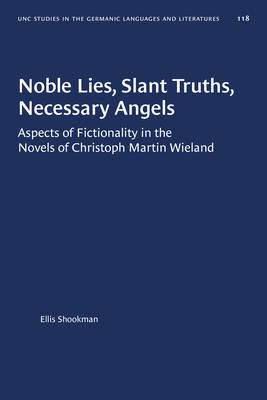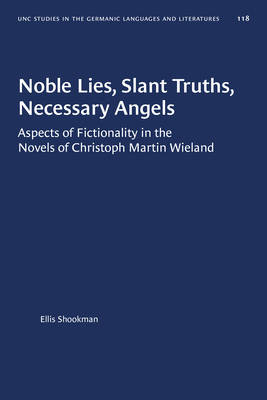
- Afhalen na 1 uur in een winkel met voorraad
- Gratis thuislevering in België vanaf € 30
- Ruim aanbod met 7 miljoen producten
- Afhalen na 1 uur in een winkel met voorraad
- Gratis thuislevering in België vanaf € 30
- Ruim aanbod met 7 miljoen producten
Zoeken
Noble Lies, Slant Truths, Necessary Angels
Aspects of Fictionality in the Novels of Christoph Martin Wieland
Ellis Shookman
€ 39,95
+ 79 punten
Omschrijving
Using the nine novels of Christoph Martin Wieland (1733-1813) as case studies, Shookman explores the notion of fictionality both as a distinctive feature of the stories themselves and as a distinguishing characteristic of the fanciful notions, moral laws, political utopias, religious beliefs, and artistic concepts that they describe. The novels show readers why they should take fictions seriously, yet not literally -- or how to suspend disbelief without suspending judgment.
Shookman uses the concepts of imagination, ideals, and illusion to investigate how Wieland's novels define fiction, know its referents, and accept its truths. He places Wieland's use of fictionality in the evolution of the German novel, while also using his work to comment on academic and real world implications of fictionality.
Shookman uses the concepts of imagination, ideals, and illusion to investigate how Wieland's novels define fiction, know its referents, and accept its truths. He places Wieland's use of fictionality in the evolution of the German novel, while also using his work to comment on academic and real world implications of fictionality.
Specificaties
Betrokkenen
- Auteur(s):
- Uitgeverij:
Inhoud
- Aantal bladzijden:
- 256
- Taal:
- Engels
- Reeks:
- Reeksnummer:
- nr. 118
Eigenschappen
- Productcode (EAN):
- 9781469656496
- Verschijningsdatum:
- 1/05/2020
- Uitvoering:
- Paperback
- Formaat:
- Trade paperback (VS)
- Afmetingen:
- 152 mm x 229 mm
- Gewicht:
- 381 g

Alleen bij Standaard Boekhandel
+ 79 punten op je klantenkaart van Standaard Boekhandel
Beoordelingen
We publiceren alleen reviews die voldoen aan de voorwaarden voor reviews. Bekijk onze voorwaarden voor reviews.











